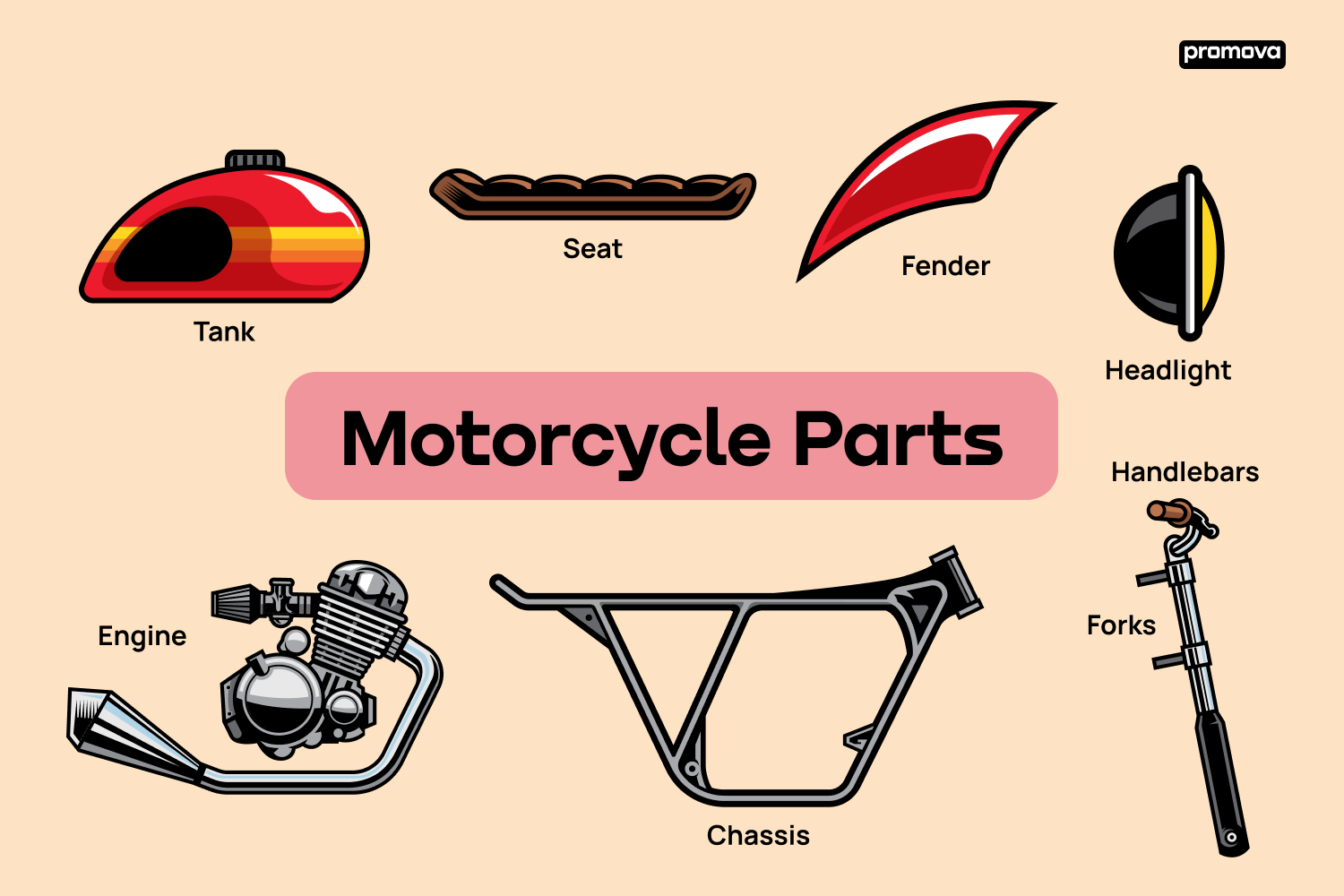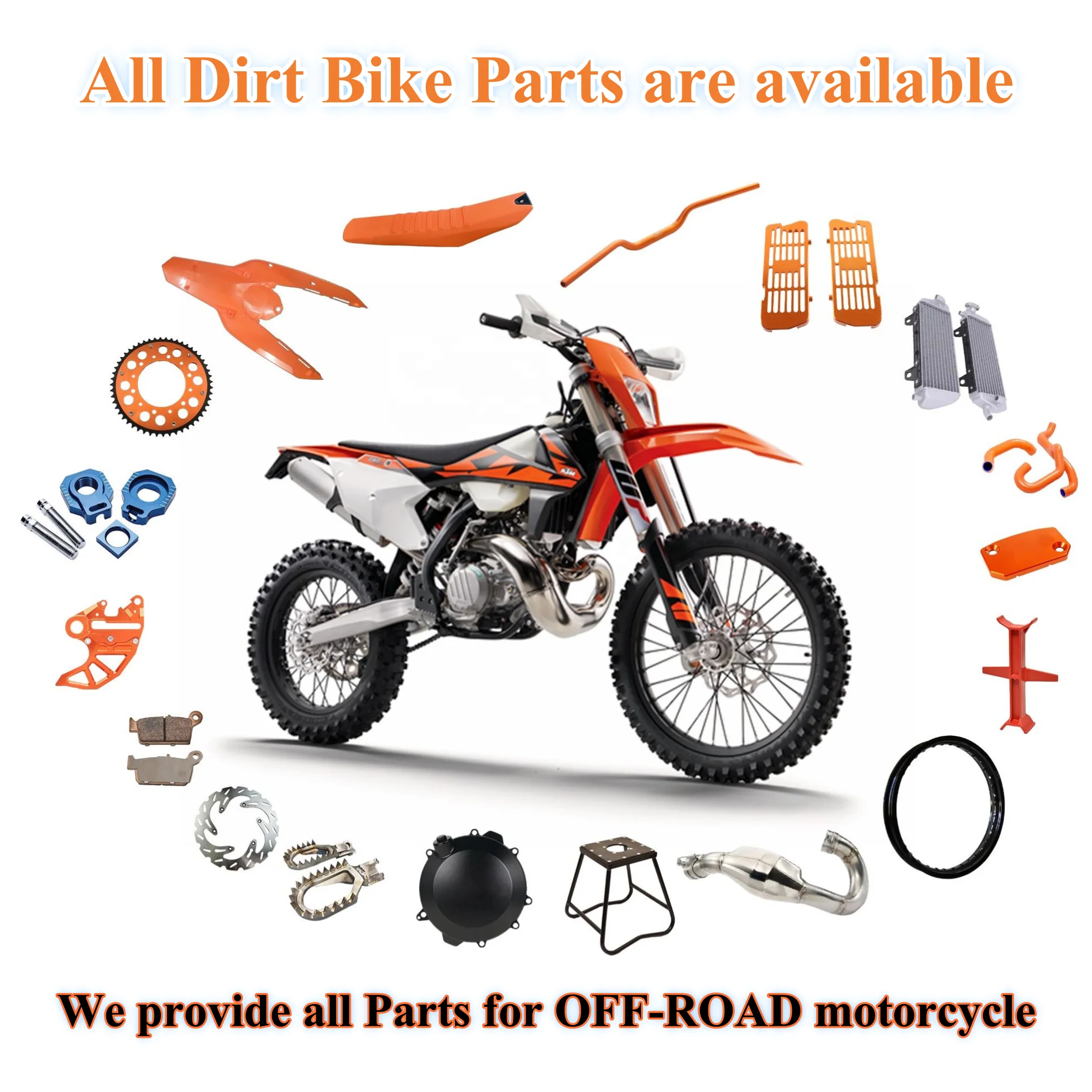Why Regular Checks on Motorcycle Spares Christchurch Prevent Breakdowns
Why Regular Checks on Motorcycle Spares Christchurch Prevent Breakdowns
Blog Article
Discover the Necessary MotorBike Parts You Need for Optimal Efficiency
Recognizing the crucial parts of a motorcycle is essential for achieving peak efficiency. Each component, from the engine to the braking system, plays a crucial role in overall functionality and security. Routine maintenance can prevent unanticipated failings and enhance the riding experience. Several riders ignore the ins and outs of these systems. Discovering exactly how they interact can bring about a much more reliable experience. What critical elements should every cyclist focus on?
The Engine: The Heart of Your Bike
The engine serves as the core part of a motorcycle, driving its performance and defining its capacities. It is accountable for transforming fuel into power, which powers the bike ahead. Different kinds of engines are used, including single-cylinder, V-twin, and inline setups, each offering distinct attributes suited for various riding purposes and styles. The engine dimension, normally gauged in cubic centimeters (cc), considerably influences performance, with larger engines usually supplying even more power and torque.Furthermore, the engine's style and modern technology, such as fuel shot systems or air-cooling versus liquid-cooling, impact effectiveness and dependability. Maintenance is essential for peak operation; elements like normal oil modifications and checking ignition system guarantee longevity. Riders usually think about an engine's responsiveness and level of smoothness, as these attributes boost the general riding experience. Inevitably, the engine remains an essential aspect that defines not just the bike's efficiency but likewise the biker's link to the machine.
The Transmission: Changing Gears Smoothly
The transmission plays a vital function in a motorbike's efficiency, particularly in the mechanics of gear shifting. Recognizing just how to move equipments efficiently can enhance the overall riding experience, while routine upkeep assurances peak functionality. Correct attention to these aspects can greatly influence the long life and effectiveness of the motorbike.

Gear Shifting Mechanics
Smooth gear changing is vital for optimal motorbike efficiency, substantially influencing both acceleration and control. The technicians of equipment changing involve the interaction in between the clutch, equipment lever, and transmission system. When a motorcyclist engages the clutch, it disengages the engine from the transmission, enabling a gear modification without damaging the components. A well-timed release of the clutch, combined with precise activity of the gear bar, helps with a smooth change between equipments. This process assures that the engine operates within its finest power band, enhancing performance. Motorcycle Parts Auckland. In addition, comprehending the gear proportions and their result on rate and torque can assist cyclists make informed options throughout changes, ultimately adding to an extra receptive and enjoyable riding experience
Upkeep Tips Importance
Regular maintenance plays a vital role in ensuring that the transmission system operates successfully, permitting for smooth equipment changes. Regularly transforming the transmission and inspecting fluid is essential, as old fluid can cause raised rubbing and wear. In addition, evaluating the clutch for wear guarantees peak interaction and disengagement, avoiding slippage throughout equipment modifications. Lubrication of relocating parts is just as vital to lower rubbing and improve efficiency. Motorbike proprietors should also monitor for leaks and uncommon noises, as these can suggest underlying concerns. By sticking to these maintenance pointers, motorcyclists can lengthen the lifespan of their transmission system, assuring that gear shifts continue to be seamless and adding to the overall efficiency of their motorbike.
The Braking System: Ensuring Safety And Security on Every Adventure
Braking systems are essential parts that directly affect a motorcycle's security and efficiency. They contain various components, including brake pads, blades, calipers, and hydraulic lines, all interacting to ensure efficient deceleration. The sort of braking system-- usually either disc or drum-- influences responsiveness and quiting power.Regular maintenance is necessary to promote peak performance; worn brake pads can result in reduced efficiency and raised quiting ranges. Additionally, the top quality of brake liquid ought to be kept track of, as it can absorb moisture with time, jeopardizing stopping efficiency.Riders should likewise think about the relevance of anti-lock braking systems (ABS), which protect against wheel lockup throughout abrupt stops, improving overall safety and security. Appropriately working brakes are not practically stopping; they instill self-confidence in the biker, enabling safer navigation through different surfaces. Eventually, a trustworthy stopping system is essential for taking pleasure in every adventure with comfort.
The Suspension: Enhancing Convenience and Control
A well-functioning shock absorber significantly adds to a motorcycle's overall efficiency, complementing the performance of the stopping system. The suspension plays a significant duty in absorbing shocks from uneven surface areas, ensuring a smoother ride while maintaining tire call with the roadway. This get in touch with is important for both security and control, enabling bikers to navigate corners with confidence and precision.Different kinds of suspension systems, such as telescopic forks or mono-shocks, supply differing levels of comfort and handling. Effectively tuned suspension improves responsiveness, supplying the cyclist with a much more connected feeling to the motorcycle. Regular upkeep checks are very important to determine the suspension parts, including springs and dampers, are working at their best. An effective shock absorber not only elevates the riding experience but likewise contributes to the durability of various other motorcycle components by decreasing damage. As a result, investing in quality suspension is essential for any type of major motorbike fanatic.
The Tires: Connecting You to the Road
Tires play an essential duty in a motorbike's efficiency, acting as the main link between the motorcyclist and the roadway. Understanding the different sorts of tires offered can considerably influence taking care of and security. Furthermore, normal maintenance is essential to guarantee peak tire efficiency and longevity.
Tire Types Explained
Just how do different tire kinds affect a motorbike's performance? Tire types play an important duty in determining a motorbike's hold, handling, and stability. Sport tires, made for high performance, deal boosted grip and responsiveness on paved roadways, making them perfect for racing and hostile riding. Alternatively, exploring tires focus on toughness and convenience, supplying a smoother trip for long-distance travel. Off-road tires, identified by their sturdy walk patterns, succeed in grip on unpaved surface areas, appropriate for adventure fanatics. Additionally, dual-sport tires blend features from both on-road and off-road classifications, providing to flexible riding needs. Ultimately, picking the appropriate tire type is essential for maximizing performance, making sure safety and security, and improving the overall riding experience.
Maintenance Tips Offered
While riding on the roadway, preserving excellent tire condition is vital for safety and performance. Regularly inspecting tire stress is necessary, as under-inflated tires can result in inadequate handling and raised wear. It is recommended to check tread deepness regularly; worn tires compromise grip and stability. On top of that, motorcyclists should seek signs of damage, such as cracks or bulges, which can indicate the requirement for substitute. Turning tires periodically ensures also wear, enhancing longevity. Keeping tires tidy from particles and preventing too much aesthetics can lengthen their life expectancy. Keeping proper positioning and balance contributes to peak performance, lessening stress on other bike elements. Adhering to these upkeep suggestions will greatly enhance the general riding experience.
The Fuel System: Sustaining Efficiency and Effectiveness
The gas system plays an essential duty in making the most of a motorbike's efficiency and performance, as it guarantees the optimal shipment of fuel to the engine. It comprises a number of crucial elements, consisting of the gas tank, gas pump, gas filter, and gas injectors or carburetor. Each component should function successfully to guarantee a effective and smooth ride.The gas tank stores fuel and provides it to the engine using the gas pump, which generates the required stress. A gas filter stops pollutants from going into the engine, while the injectors or carburetor mix gas with air for combustion.Proper upkeep of the gas system is essential; a clogged filter or malfunctioning injector can bring about lowered performance and raised fuel intake. By confirming that go right here the gas system operates efficiently, bikers can take pleasure in enhanced throttle response, better gas economic climate, and generally boosted riding experience.
The Electric System: Powering Your Adventure
An efficient electrical system is important for the total functionality and safety and security of a motorcycle, as it powers vital elements such as the ignition, lighting, and different electronic systems. This system consists of the battery, which shops energy, and the generator, in charge of creating power while the engine runs. The electrical wiring harness attaches these parts, making certain reputable power distribution.Additionally, merges shield the system from overloads, while relays aid regulate high-current gadgets with low-power signals. A well-kept electrical system enhances efficiency by making certain smooth begins and constant procedure of signals and lights, vital for biker visibility and safety.Regular checks of the battery's cost and links are essential for avoiding electrical failures. Bikers must likewise inspect electrical wiring for wear and tear, making sure all parts operate ideally. Ultimately, a robust electric system adds significantly to the total efficiency and dependability of the motorcycle.
Regularly Asked Questions
Just how Typically Should I Replace My Motorcycle's Battery?
The regularity of motorcycle battery replacement depends upon usage and maintenance (Motorbike Components NZ). Generally, batteries should be replaced every three to 5 years. Regular checks can aid recognize when a replacement is required for peak performance
What Tools Do I Required for Fundamental Motorcycle Upkeep?
For fundamental motorcycle maintenance, one needs essential devices such as a socket collection, wrenches, screwdrivers, pliers, tire stress gauge, and a torque wrench. These devices promote reliable upkeep and ensure the bike runs effectively and safely.
Just How Can I Boost My Motorcycle's Aerodynamics?
To improve motorbike aerodynamics, one ought to think about changing fairings, making use of windshield extensions, enhancing body setting, and decreasing general weight. These modifications help reduce drag, boosting security and fuel performance throughout adventures.
What Are the Indicators of a Failing Electric System?
Indications of a falling short electric system include dimming lights, problem starting, uneven tool readings, and blown merges. Motorcycle Spares Christchurch. Unusual scents or deterioration around battery terminals may likewise suggest underlying problems needing instant attention for safety and security and efficiency

How Do I Pick the Right Oil for My Bike?
When selecting oil for a motorcycle, one ought to think about the producer's requirements, thickness rankings, and the sort of riding. see here Additionally, artificial versus traditional oil can influence efficiency and engine protection, affecting the choice significantly. The engine size, normally determined in cubic centimeters (cc), considerably influences efficiency, with bigger engines typically giving even more power and torque.Furthermore, the engine's design and technology, such as gas injection systems or air-cooling versus liquid-cooling, impact efficiency and reliability. A well-functioning suspension system substantially adds to a motorbike's overall efficiency, enhancing the performance of the stopping system. The gas system plays an important duty in making best use of a motorcycle's efficiency and effectiveness, as it ensures the optimum delivery of gas to the engine. A fuel filter prevents pollutants from going into the engine, while the injectors or carburetor mix gas with air for combustion.Proper maintenance of the fuel system is crucial; a blocked filter or malfunctioning injector can lead to lowered efficiency and raised fuel consumption. A properly maintained electric system boosts efficiency by making sure smooth starts and consistent operation look at here of lights and signals, vital for biker exposure and safety.Regular checks of the battery's cost and links are crucial for avoiding electric failures.
Report this page